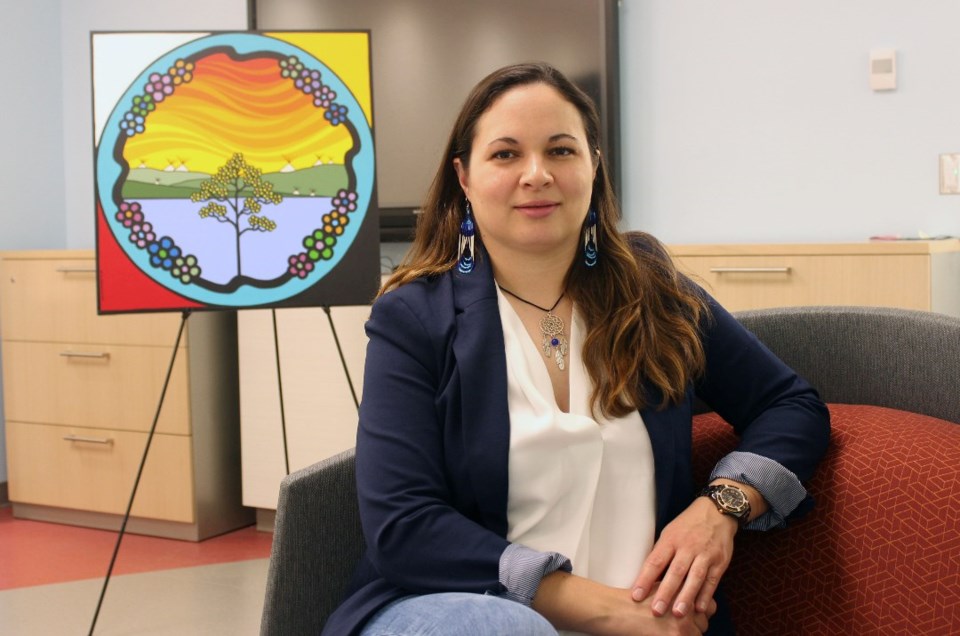SASKATOON – Newly appointed Tier 2 Canada Research Chair (CRC) Dr. Wendie Marks (PhD) at the University of Saskatchewan (USask) is investigating links between obesity in Indigenous children and their exposure to environmental factors during pre-conception, prenatal, or early postpartum periods.
“My research program aims to identify and address potential barriers to wellness that may be passed from generation to generation in Indigenous people,” said Marks, assistant professor in pediatrics at USask’s College of Medicine.
“As a status First Nations and member of the Anishinabe of Wauzhushk Onigum First Nation located on Treaty 3 territory, this work is also personal to me and offers me an opportunity to learn more about my own history,” she said.
Marks is especially interested in learning the underlying factors that contribute to the high prevalence of obesity of Indigenous children on the Prairies, where obesity levels of Indigenous persons on reserves exceed the Canadian average for both off-reserve members and the non-Indigenous population.
“Canada’s colonization policies, including the residential school system, exposed Indigenous peoples to both chronic stress and malnutrition during important developmental periods,” said Marks. “These factors play a strong determining role in the eventual or potential development of metabolic disorders such as obesity in Indigenous children.”
Her CRC in Developmental Origins of Health and Disease in Indigenous People provides annual funding over five years and is renewable once for another five years. The CRC will contribute to the expanding research community at USask by providing training for five USask doctoral or master’s level students, and six undergraduates.
Testimony by residential school survivors at the Truth and Reconciliation Commission consistently described—among the stressful conditions—the common experience of hunger at school due to a poor-quality diet containing minimal protein, limited fresh fruit and vegetables, and frequent food-borne infections.
Such traumas can alter brain-gut responses that regulate the gut microbiome—the important collection of micro-organisms that colonize the gastrointestinal tract—causing modifications that lead to intergenerational metabolic disorders such as obesity and diabetes, Marks said.
Marks’ research program will comprise interdisciplinary and multi-stakeholder team members including, Indigenous Knowledge Keepers, persons with lived experience, Indigenous and non-Indigenous scientists, researchers, and clinicians. She currently has collaborators from USask and the University of Calgary (UCalgary).
Her USask colleagues Dr. John Howland (PhD) and Dr. Robert Laprairie (PhD) bring expertise in stress biology and biochemistry. Drs. Sylvia Abonyi (PhD) and Sarah Oosman (PhD) have established deep-rooted relationships with both Métis and First Nations community members in Saskatchewan and will provide expertise in community-based participatory research and in investigating the effects of discrimination and residential schools on metabolic disorders. Dr. Nazeem Muhajarine (PhD) will contribute expertise in maternal and child health, as well as analytical quantitative analysis.
From UCalgary, Dr. Jane Shearer (PhD) and Dr. Raylene Reimer (PhD) will provide expertise in gut-brain interactions and the gut microbiome, metabolites, nutrition, and intergenerational transmission of metabolic disease risk.
With her extensive experience in working with animal models of diseases, Marks’ first goal will be to develop a preclinical rodent model. Marks’s model of stress and malnutrition is targeted to provide insight into the physiological mechanisms that could be driving the high prevalence rates of metabolic diseases, with a focus specifically on the intergenerational impacts. This preclinical work will identify pathways for clinical and translational research that will round out her second objective.
For objective two she will use a community-based approach to investigate the association between maternal stress and nutrition, the gut microbiome, and obesity in Indigenous children using a prospective birth cohort design. That means working in partnership with Indigenous expectant mothers and following their newborns throughout childhood to look at factors such as their stress, diet, health, and social determinants of health.
Guided by Métis and First Nations’ perspectives, Marks will partner with Indigenous communities in Saskatchewan to create pathways rooted in traditional ways of knowing. Marks and her team will explore potential strategies to improve wellness in Indigenous children. Developing strategies to address obesity and its associated factors will go well beyond five years, she said.
“You can break down obesity to a number of underlying factors, likely linked to depression, maladapted ways of coping, and addiction-related behaviour, which are long-term impacts of intergenerational stress and trauma,” said Marks. “So, the focus for me would go from obesity to addictions to mental health, which all fall under the umbrella of the effects of intergenerational trauma.”
— Submitted by USask Media Relations
You can no longer count on social media to deliver important news to you. Keep your news a touch away by bookmarking SASKTODAY.ca's homepage at this link.
Here's why you should bookmark your favourites.
Subscribe to SASKTODAY.ca newsletter to get our daily news to your inbox.




